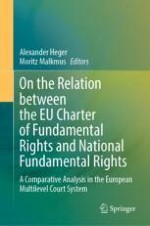2024 | OriginalPaper | Buchkapitel
The Charter of Fundamental Rights of the European Union at the Portuguese Constitutional Court: The Data Retention Cases
verfasst von : Francisco Pereira Coutinho
Erschienen in: On the Relation between the EU Charter of Fundamental Rights and National Fundamental Rights
Verlag: Springer Nature Switzerland
Aktivieren Sie unsere intelligente Suche, um passende Fachinhalte oder Patente zu finden.
Wählen Sie Textabschnitte aus um mit Künstlicher Intelligenz passenden Patente zu finden. powered by
Markieren Sie Textabschnitte, um KI-gestützt weitere passende Inhalte zu finden. powered by
